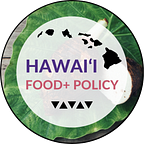An Omnibus Bill May be What’s Needed to Transform Hawaiʻi’s Food System
An op-ed about the urgent need to transform Hawaiʻi’s food system which could be done through an omnibus bill.
By: Erwin Quinanola, Hawaiʻi Food+ Policy Intern
We urgently need to transform Hawaiʻi’s food system to, among other things, address the system’s shortcomings exposed by the COVID-19 pandemic.
Many of our lower income residents suffered severe food insecurity and malnutrition resulting from job losses during the shutdown and lack of government support. In the early days of the pandemic, the entire population of the state was in a panic mode trying to stock up on food to sustain themselves throughout the stay-at-home mandate. Bare supermarket shelves were a common sight. The look of apprehension on peoples’ faces revealed feelings of uncertainty whether enough food was going to be available. The most overwhelming concern was the access to a sustainable supply of healthy and nutritious food to beef up the immune system. With the state dependent on food imports to provide 90% of what we commonly consume, the choice for healthy options is narrow. In addition, our stockpile infrastructure can only accommodate a total volume of food to provision the state’s population for about 5 to 7 days. We can only hope that, during future disasters, shipping deliveries continue to come. Otherwise, food insecurity and malnutrition will suddenly become all too real for all of us.
There is a need to increase our stockpile capacity to 14 days or more and increase local food production for direct local consumption (Miles & Merrigan, 2020). Currently, there is no law or bill being passed to address stockpile capacity. But for local food production for direct local consumption, SB335 was at least an effort at requiring the state’s Agribusiness Development Corporation to put 50% of its lands into local production for local consumption.
Passing SB335 would have been a milestone, but it takes more than a milestone to transform a food system. What we need is a bill that creates the essential social, political, intellectual, and economic spaces needed to build a sustainable and resilient food system (Feenstra, 2002), a bill that contains all essential measures to initiate transformation — an omnibus bill. By building healthy working relationships with our legislative leaders, we can put ourselves in a unique position to help inform them of the necessary elements, backed by research, needed to give the omnibus the most impactful effect directed at equitable community development.
The omnibus will help facilitate the creation of a sustainable and resilient food system. It must cover appropriating more land for local food production, food hubs and farm to school programs, food security, SNAP double-up bucks and other money transfer incentives, incentives for sustainable farming practices, emergency food management, and climate change mitigation measures in line with Hawaiʻi’s Sustainable Development Goals. We need an omnibus bill because we cannot afford anymore delays in a situation where time is of the essence, given that we only have twelve years to avert an epic environmental crisis. We would have better chances with an omnibus bill because “omnibus bills are almost always enacted into law” (Krutz, p. 210), which can be the catalyst that we are looking for to create a sustainable and resilient food system.
What makes an omnibus bill a plausible idea? Congressional leaders use the omnibus tactic to gather legislative coalitions under a unifying, multidimensional preference that is of mutual interest — usually involving the opposition. An omnibus, because of its nature, skips through the traditional legislative process and often fast-tracks through the committees with less exhaustive investigation. It is treated as a single piece of legislation where floor members only have a take-it-or-leave-it option, and often not being fully aware of the details of its content. Over many years, omnibus packages have proven to be a viable way of pushing legislation because leaders strategize carefully to put together omnibus bills that will succeed (Krutz, p. 210). This option will give us a direction of higher certainty in the passage of bills for advancing sustainable food system transformation.
About the Author
Erwin Quinanola is in transition between careers and is passionate about the work to provide healthy, culturally appropriate food to people. The underlying goal behind this passion anchors deeply into the principles of sustainability and global climate change mitigation. Erwin maintains an active Hawaiʻi Registered Dental Hygienist license while working to complete a degree in Sustainable Community Food Systems from the University of Hawaiʻi — West Oahu.
